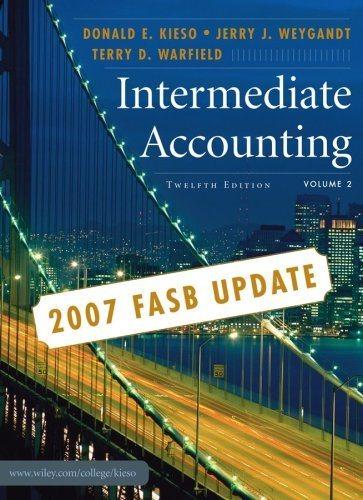(Revenue Recognition) Nimble Health and Racquet Club (NHRC), which operates eight clubs mE in the Chicago metropolitan...
Question:
(Revenue Recognition) Nimble Health and Racquet Club (NHRC), which operates eight clubs mE in the Chicago metropolitan area, offers one-year memberships. The members may use any of the eight facilities but must reserve racquetball court time and pay a separate fee before using the court. As an incentive to new customers, NHRC advertised that any customers not satisfied for any reason could receive a refund of the remaining portion of unused membership fees. Membership fees are due at the beginning of the individual membership period. However, customers are given the option of financing the membership fee over the membership period at a 9% interest rate.
Some customers have expressed a desire to take only the regularly scheduled aerobic classes without paying for a full membership. During the current fiscal year, NHRC began selling coupon books for aerobic classes to accommodate these customers. Each book is dated and contains 50 coupons that may be redeemed for any regularly scheduled aerobics class over a one-year period. After the one-year period, unused coupons are no longer valid.
During 2004, NHRC expanded into the health equipment market by purchasing a local company that manufactures rowing machines and cross-country ski machines. These machines are used in NHRC’s facilities and are sold through the clubs and mail order catalogs. Customers must make a 20% down payment when placing an equipment order; delivery is 60-90 days after order placement. The machines are sold with a 2-year unconditional guarantee. Based on past experience, NHRC expects the costs to repair machines under guarantee to be 4% of sales.
NHRC is in the process of preparing financial statements as of May 31, 2007, the end of its fiscal year.
James Hogan, corporate controller, expressed concern over the company’s performance for the year and decided to review the preliminary financial statements prepared by Barbara Hardy, NHRC’s assistant controller.
After reviewing the statements, Hogan proposed that the following changes be reflected in the May 31, 2007, published financial statements.
1. Membership revenue should be recognized when the membership fee is collected.
2. Revenue from the coupon books should be recognized when the books are sold.
3. Down payments on equipment purchases and expenses associated with the guarantee on the rowing and cross-country machines should be recognized when paid.
Hardy indicated to Hogan that the proposed changes are not in accordance with generally accepted accounting principles, but Hogan insisted that the changes be made. Hardy believes that Hogan wants to manage income to forestall any potential financial problems and increase his year-end bonus. At this point, Hardy is unsure what action to take.
Instructions
(a) (1) Describe when Nimble Health and Racquet Club (NHRC) should recognize revenue from membership fees, court rentals, and coupon book sales.
(2) Describe how NHRC should account for the down payments on equipment sales, explaining when this revenue should be recognized.
(3) Indicate when NHRC should recognize the expense associated with the guarantee of the rowing and cross-country machines.
(b) Discuss why James Hogan’s proposed changes and his insistence that the financial statement changes be made is unethical. Structure your answer around or to include the following aspects of ethical conduct: competence, confidentiality, integrity, and/or objectivity.
(c) Identify some specific actions Barbara Hardy could take to resolve this situation.
Step by Step Answer:

Intermediate Accounting 2007 FASB Update Volume 2
ISBN: 9780470128763
12th Edition
Authors: Donald E. Kieso, Jerry J. Weygandt, Terry D. Warfield





